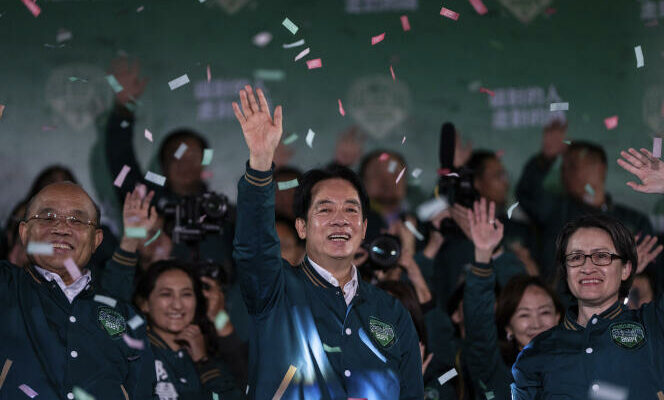As the afternoon wore on on Saturday, January 13, Ou Ouling and her husband returned to the polling station on Linsen Street in central Taipei. They had already voted at 11 a.m. but wanted to take a look at the count. “It’s our system, everyone can enter, it’s open, it’s transparent”explained this woman in flip-flops, black jeans and a red hoodie.
After the polling station closed at 4 p.m., the citizen assessors emptied the ballot boxes. In the room, where anyone can enter and freely witness the counting of votes, one of the assessors said loudly the name on each ballot, pink for the presidential election, yellow for the legislative elections, then showed it to the assistance.
As soon as the results were confirmed at the start of the evening, the two opponents of the winner, Vice-President Lai Ching-te (also known by his English name William Lai), conceded their defeat without dispute and congratulated the new elected official, a sign of a mature democracy, where nearly 72% of citizens over the age of 20 voted. This democratic electoral process constitutes a headache for China, which promises to reunify the island with the mainland on its own terms. “We are very proud of this. Even if the candidates are disappointed with the result, they accept the people’s choice”declared Chen Yijing, a 36-year-old man, who came to participate in the rally organized in the center of the capital for Mr. Lai’s victory.
Beijing without solution
Faced with the choice of Taiwanese voters, Beijing seems without a solution. On Saturday evening, Chinese Taiwan Affairs Office spokesperson Chen Binhua said the vote “will not hinder the inevitable trend towards reunification with China”. But it is clear that Beijing’s repeated threats since President Tsai Ing-Wen came to power in 2016 have not convinced the Taiwanese to choose the path of rapprochement. In recent years, Chinese air overflights near the island of Taiwan have become almost daily and Beijing is increasing the number of large-scale military exercises.
With just over 40% of the vote, compared to the 57% recorded by Tsai Ing-wen four years earlier, the vote for the presidential party, the Democratic Progressive Party (DPP), is in clear decline, but this is the first time since the democratization of the island, in the mid-1990s, that a political party has won three successive presidential elections. A dark scenario for Beijing. Because if its leaders continue to repeat that they will maintain the status quo – without a formal declaration of independence, Taiwan already exercising de facto sovereignty – the DPP retains in its charter the quest for independence, which constitutes a casus belli for China. Lai Ching-te notably promised to further integrate Taiwan, already the undisputed leader in semiconductors, into trade with open economies and democratic countries, to reduce his country’s dependence on China.
You have 55% of this article left to read. The rest is reserved for subscribers.
